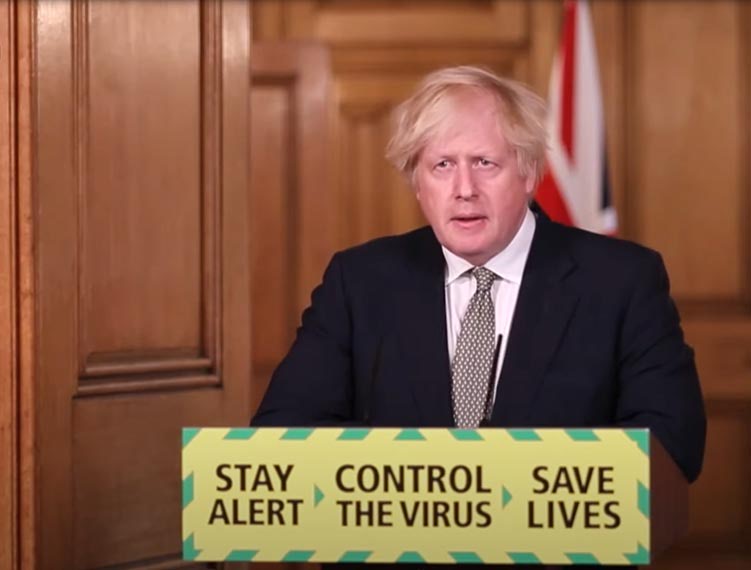Apprentice Guarantee for young people – Sector Response to Boris Johnson’s comment

#SeptemberPromise – On last night’s daily Government briefing (Wednesday 3rd June 2020), Prime Minister @BorisJohnson mentioned an #ApprenticeGuarantee for young people, particularly in light of the Coronavirus crisis and the impact this could have on youth unemployment.
The Prime Minister, Boris Johnson said:
“For young people in particular, for whom the risk is highest of losing jobs, I think it’s going to be vital that we guarantee apprenticeships.”
Incredibly exciting proposal from the PM. I’ve been campaigning for this for some time and asked the PM about this only last week (https://t.co/NDLxcKt1x4)
It could transform the life chances of so many young people and would help us to build an apprenticeships & skills nation. pic.twitter.com/Jq2vCudhjS
— Robert Halfon MP -Working Hard for Harlow- (@halfon4harlowMP) June 3, 2020
 Which is really interesting!
Which is really interesting!
Tune in to hear Gillian Keegan’s views on this on tonight’s #SkillsWorldLive show on FE News 7-8pm.
We also asked for the FE sector’s comments to the Prime Minister’s comments on an Apprenticeship Gaurantee for young people:
The Sector Response to an Apprenticeship Guarantee:
 Association of Employment and Learning Providers chief executive Mark Dawe, said:
Association of Employment and Learning Providers chief executive Mark Dawe, said:
“The Prime Minister is absolutely right to make this commitment when history tells us that young people often suffer the most during recessions. AELP will be presenting robust proposals to government on how it can be implemented.
“Urgent action is needed because the deadline of 10 June for new furloughs means thousands of existing apprentices who are currently being trained while on furlough face the threat of being laid off and there must be a package of support for them as well as proper plans to protect potential new apprentices.
“For the PM’s promise to become reality, the DfE has to protect the training infrastructure needed to deliver the hundreds of thousands of apprenticeship opportunities required and right now the department stands out like a sore thumb in leaving the two-thirds of current apprenticeships outside the scope of training provider support offered so far.”
 David Hughes, Chief Executive of the Association of College (AoC), said:
David Hughes, Chief Executive of the Association of College (AoC), said:
“I’m pleased to hear Boris Johnson is prioritising young people’s future in considering to guarantee apprenticeship places. We know that this will be challenging to achieve and look forward to helping design the range of programmes needed to deliver it. We know that any plan for guaranteed apprenticeships will require a collaborative effort to encourage employers to take on and retain their young apprentices, to find alternative employers if this is not possible, and to identify college-based education and training to prepare young people to be ready for an apprenticeship when they are available.
“Our own Recovery Plan centres on a new September Promise to all young people of a place in education and training which helps them to succeed. A key part of that will be the preparation to be ready for an apprenticeship and will be central to the Prime Minister’s ambitions for a good recovery in which young people are not ‘scarred’ by long term unemployment and nobody is left behind.”
 Tom Bewick, Chief Executive of the Federation of Awarding Bodies comments:
Tom Bewick, Chief Executive of the Federation of Awarding Bodies comments:
“I think an ‘Apprenticeship Guarantee’ is a great slogan, although in practice, the idea needs a lot of work on it if we are to rescue the apprenticeship brand as a premier skills and productivity programme valued by employers and young people alike. The experience of the 1980s and high youth unemployment taught us that government make-work schemes can do more harm than good if they are really designed to conceal the jobless numbers.
“What we need is a strong ‘Youth Pledge’ for the under-30s where government puts in place a series of high quality offers that includes funding to support full-time education places in FE and HE; grants to charities to take on paid young people to support community projects; including those overseas; and both training and wage subsidies to employers that recruit, retain and develop young people in the skilled occupations of the future.”
 Emily Jones, Head of Research, Learning and Work Institute said:
Emily Jones, Head of Research, Learning and Work Institute said:
“Our analysis shows that young people will be among those hit hardest by the economic impact of the pandemic. Apprenticeships clearly have a key role to play and a ‘guarantee’ would help to ensure that young people progress through employment and training. However, many young people struggle to meet the entry requirements for apprenticeships, so the guarantee would need to be backed up by appropriate pre-apprenticeship training and careers advice.
“If we are to make a guarantee work, we will need to reverse the decline in apprenticeships for young people. The number of 16-18 year olds starting an apprenticeship is down three quarters on last year as a result of the coronavirus crisis. Yet even before the start of the crisis, the number of young people accessing apprenticeships was declining; last year 16-18 year olds represented only a quarter of apprenticeship starts. Recent reforms, particularly the introduction of the apprenticeship levy, have led many employers to focus on upskilling existing staff and older workers, rather than recruiting young people. An apprenticeship guarantee will therefore require decisive action from government, including investment, to incentivise employers to provide these opportunities at scale.”
 David Gallagher, Chief Executive at NCFE, commented:
David Gallagher, Chief Executive at NCFE, commented:
“It is clear that the labour market is going to be extremely challenging, particularly for young people, for the foreseeable future. It is also clear to us that current Government policy, funding and programmes need to respond rapidly, proportionately and appropriately to address these challenges. To protect the UK’s economic interests, it has never felt more important that we ensure that every penny of public money is spent wisely, fairly and on the societal and economic issues that matter most. To this end, we firmly believe that investing in the future of our young people during this time is of paramount importance. Therefore, we need well considered, balanced policy decisions that are based on robust evidence of what has worked and can work now, in our ‘new normal’.
“On the surface, the notion of an ‘apprenticeship guarantee’, seems positive. It does however raise a raft of questions that we need to explore, looking at the evidence around what works and ensuring that any policy decisions taken do not compromise the apprenticeship system, its benefit to the economy and society and the long-term. Question threads such as; who pays the apprentices wage? If government, how do ensure that any wage subsidies don’t displace jobs fully paid by employers? How do we protect the Apprenticeship brand? How will quality regimes and metrics being amended to reflect policy and programme changes? Who is eligible and why? There is a very long list of questions that need to be fully examined and answered to ensure that the policy rhetoric turns into fit for purpose and impactful programme delivery. Widening access to full time education for 19-24 year olds should also be considered, as the apprenticeship guarantee cannot be only option available for young people.”
 Tony Wilson, Director Institute for Employment Studies, said:
Tony Wilson, Director Institute for Employment Studies, said:
“We’re in the middle of a jobs crisis as well as a public health one, with unemployment almost certainly higher now than it has ever been before – higher even than the Great Depression.
“Young people will be particularly hard hit, and we know that long-term unemployment while young has lasting impacts on future earnings, job security, incomes, health and wellbeing. So it’s welcome that the government wants to prioritise support for young people in the emergency budget.
“Apprenticeships must be part of the answer here, and it would be great to be able to guarantee that anyone who wanted one could get a good quality apprenticeship. But not everyone will want one, and nor will it always be the right option. So the real guarantees that we need are that every young person leaving education will get the employment, careers and skills support to find good work; and that no young person will become long-term unemployed.”
 Kirstie Donnelly MBE, CEO City & Guilds Group, said:
Kirstie Donnelly MBE, CEO City & Guilds Group, said:
“We welcome the announcement from the Prime Minister guaranteeing apprenticeships for all young people whose job prospects have been damaged as a result of the coronavirus pandemic. Already, huge numbers of young people across the UK have been put out of work and we must ensure that they are not left behind as the country looks to its recovery.
“However, as we start on that path towards economic recovery, it is critical that any apprenticeships are guided by employer demand – matching training provision with the skills needed by employers both today and in the future. We must not lose sight of the purpose of the long-lasting, quality apprenticeship and End Point Assessment system that we have worked so hard to build over the past decade.
“We would also be wrong to treat apprenticeships as a silver bullet – they are just one part of the jigsaw. With unemployment levels reaching record highs, we need to ensure there are different solutions available to meet the needs of both individuals and employers. Those displaced from certain sectors may instead require short-term training courses or assistance with identifying and showcasing transferable skills as they move between industries. Rather than focusing solely on apprenticeships, we need a degree of flexibility and better availability of government funding. We ask that the Government consider how best to allocate funding and proposals such as the Adult Education Budget, National Skills Fund and National Retraining Scheme to ensure that these are available in the right places and ensure that people have – and are able to demonstrate – the skills that employers are most in need of as we emerge from the crisis.”
 Steve Nash, CEO of the Institute of the Motor Industry, said:
Steve Nash, CEO of the Institute of the Motor Industry, said:
“The announcement last night from the Prime Minister is tremendously positive for the future of apprentices. We know more detail is to come later this month and in July, but we sincerely hope that the impact of COVID-19 on current and future apprentice recruitment plans is fully understood.
“In the automotive retail sector, which the Institute of the Motor Industry represents, the pause button has been hit hard on apprenticeship recruitment as our on-going research has identified:
- 71% of employers stated that the likely number apprentices will fall in 2020 compared to 2019
- A drop of as much as 65% is expected in the number of apprentices recruited this year. The planned numbers are now only a third of 2019 levels.
- Only 9% said their apprentice recruitment plans will not change as a result of COVID-19.
- Training providers are also predicting a fall of on average 38% in their intake for 2020/21 compared to 2019/20.
“With such a sharp drop in apprentice employment and recruitment, larger employers anticipate that their unused Levy funds will be taken back by government. And this will create a dearth of funding just as the sector will be emerging from the COVID-19 downturn. Last month I therefore wrote to Gillian Keegan, MP, Parliamentary Under-Secretary of State for Apprenticeships & Skills requesting that the current clawback applied to unused Apprenticeship Levy funds is halted for a two year period. I am currently awaiting a reply.
“We hope government takes heed of the fact that 71% of employer respondents to our research agree that a pause on the Apprentice Levy clawback would improve their prospects of employing apprentices. And that has to be a key factor to support the Prime Minister’s worthy ambition.”
 Elizabeth Taylor, Chief Executive of ERSA comments:
Elizabeth Taylor, Chief Executive of ERSA comments:
“An Apprenticeship Guarantee is welcomed for those who want to take this route into work, but it should be part of a range of offers for young people where there is choice linked to careers guidance.
“This range should include training, education, transitional jobs, work experience, jobs, alongside apprenticeships”.
 Richard Marsh, Director of Apprenticeships, Kaplan Financial, said:
Richard Marsh, Director of Apprenticeships, Kaplan Financial, said:
“Any support for Apprenticeships is welcome and Government support is essential, but they must remain employer-led – or they aren’t Apprenticeships”
Richard Marsh also wrote an incredibly well timed thought leadership piece on an Apprenticeship Guarantee, which you might want to view here.
An Apprenticeship Guarantee: Is it the new English answer?: Will we get a #SeptemberPromise? As the country opens up again, it feels a bit like we are returning back to a house after a storm to survey the damage.What state will the economy be in and what… https://t.co/jO5ayEuMQb pic.twitter.com/HP7K1lww94
— FE News – The #FutureofEducation News Channel (@FENews) June 4, 2020











Responses